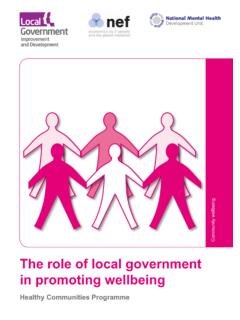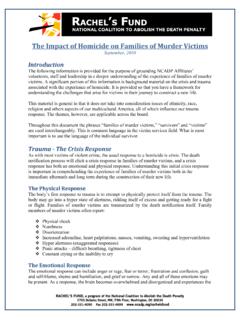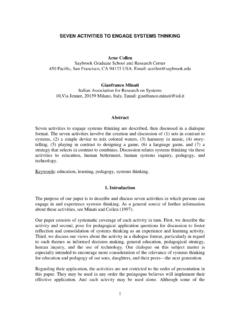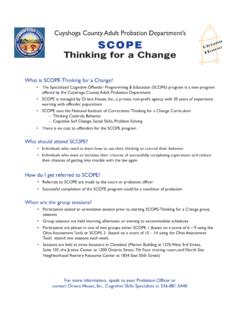Transcription of PROGRAM IMPLEMENTATION GUIDE THINKING FOR A CHANGE
1 PROGRAM IMPLEMENTATION GUIDE THINKING FOR A CHANGE Page 1 of 8 In August 2008 Ramsey County Adult Field Services authorized the use of THINKING for a CHANGE PROGRAM with voluntary support from agents and supervisors. There were two facilitator trainings conducted in the Fall of 2009 and Summer of 2010 that bore a total of 6 facilitators (5 of which are active). Through their efforts, the Adult Division has completed 11 cycles of T4C with a completion rate of approximately 70% of those referred. Based on the early indications of the recent Ramsey County recidivism study conducted, T4C is an effective intervention for the offenders under supervision within the Adult Division.
2 The evaluation department has recently completed a recidivism analysis of the offender graduates from cycles of T4C that have a year or more time post graduation. The following is a breakdown of the findings of the analysis: See Addendum #1 This fostered a need to analyze the potential for expanding the PROGRAM throughout the division with formal financial and administrative support. The following is a projection of the number of offenders who could potentially be referred into the T4C PROGRAM . Assumptions and parameters for determining clients that would be eligible and appropriate for T4C.
3 Initial population: Clients that had at least one case newly opened in supervision in 2010. There were 6,585 clients that had a new case opened in supervision in 2010. Based upon the offices/units where T4C referrals tend to come from, clients must have been supervised in a Field Office (800, South, or Park), Spruce East, Spruce North, or the Domestic Abuse Unit. The client must have been sentenced to at least 1 year of supervision on that case. The client must have an LSI-R assessment that was done by a Ramsey County agent.
4 In order to ensure the assessment is reasonably timely, up to date, and reflective of the offender s level of risk and needs, only those clients who had an LSI-done within one year before starting on supervision OR within one year after starting supervision were selected. If a client had multiple assessments, the most recent one was selected. The assessment can be of any type (initial, first reassessment) so long as it was posted to S3 Client must have been assessed as high risk scoring 25 or above on the LSI-R.
5 By the agent. 1,326 clients met these initial Unit and LSI-R conditions for PROGRAM eligibility. 761Ed Hauck of these 1,326 clients or 57% scored 25 or higher on the LSI-R. Planning and Evaluation Analyst Due to the potential demand, beginning in 2012 16 staff will complete the 32-hour THINKING for a CHANGE Facilitator Training. The Adult Field Services Division is committed to ensuring the success of the PROGRAM through proper training of staff, accessibility to training materials and continual quality assurance practices to maintain the integrity of PROGRAM IMPLEMENTATION GUIDE THINKING FOR A CHANGE Page 2 of 8 the PROGRAM .
6 This IMPLEMENTATION GUIDE serves as a roadmap for successfully implementing the PROGRAM in the Adult Field Services. It is the strategy of the Ramsey County Adult Field Services Division to utilize THINKING for a CHANGE as its primary cognitive skills curricula for offenders with an LSI-R score of 25 or higher supervised by non specialized field units. This reference GUIDE provides information and guidance for implementing, sustaining and monitoring the PROGRAM to ensure that PROGRAM integrity is maintained.
7 A. PROGRAM Requirements 1. All units unless specifically exempted by the Adult Field Services Directors will make referrals into the THINKING for a CHANGE PROGRAM . 2. All units will ensure that at least two (2) staff members are trained to facilitate the PROGRAM on a consistent basis. 3. The Unit Supervisor in collaboration with the T4C coordinator shall be responsible for the IMPLEMENTATION of the T4C PROGRAM within his/her unit. They will work to create an annual unit schedule that meets staffing needs.
8 4. The T4C PROGRAM consists of 25 sessions that must be offered in sequence. It can be offered 2-3 times per week for 2 hours each session. Specific days, time and location will be determined by each unit. Class size must be no larger than 15 participants. 5. Aftercare procedures should be arranged whenever possible for offenders who successfully complete the PROGRAM to provide continuous dosage of skill building beyond the graduation date. 6. Initially, facilitators should co-facilitate a PROGRAM at least once before conducting the PROGRAM in solo.
9 Whenever feasible, two facilitators should be used to conduct one PROGRAM . Staff awaiting an opening for a T4C facilitator training may serve under the guidance and supervision of a trained facilitator as an apprentice. 7. No changes in PROGRAM content should be made without approval from the T4C coordinator. All PROGRAM content must be offered in order and with no alteration. Any changes to PROGRAM content will be made and communicated by the National Institute of Corrections.
10 8. All units, unless specifically exempted, will have the T4C PROGRAM in place by _____. B. THINKING for a CHANGE Facilitator Selection and Training 1. The Unit Supervisor will identify staff members who will facilitate the T4C PROGRAM and submit their names to the T4C coordinator. When choosing staff to facilitate the PROGRAM , the following characteristics and requirements apply: a. Believes PROGRAM participants can CHANGE ; b. Does not easily become frustrated by participants or workload; c.















